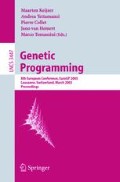Abstract
Cartesian Genetic Programming is a graph based representation that has many benefits over traditional tree based methods, including bloat free evolution and faster evolution through neutral search. Here, an integer based version of the representation is applied to a traditional problem in the field: evolving an obstacle avoiding robot controller. The technique is used to rapidly evolve controllers that work in a complex environment and with a challenging robot design. The generalisation of the robot controllers in different environments is also demonstrated. A novel fitness function based on chemical gradients is presented as a means of improving evolvability in such tasks.
Access this chapter
Tax calculation will be finalised at checkout
Purchases are for personal use only
Preview
Unable to display preview. Download preview PDF.
References
Ashmore, L.: An investigation into cartesian genetic programming within the field of evolutionary art. Technical report, Final year project, Department of Computer Science, University of Birmingham (2000), http://www.gaga.demon.co.uk/evoart.htm
Dain, R.A.: Developing mobile robot wall-following algorithms using genetic programming. In: Applied Intelligence, vol. 8, pp. 33–41 (1998)
Ebner, M.: Evolution of a control architecture for a mobile robot. In: Proc. of the 2nd International Conference on Evolvable Systems, pp. 303–310. Springer, Heidelberg (1998)
Beatriz Garmendia-Doval, A., Miller, J., Morley, S.D.: Cartesian genetic programming and the post docking filtering problem. In: O’Reilly, U.-M., Yu, T., et al. (eds.) Genetic Programming Theory and Practice II ch. 14. Kluwer, Dordrecht (2004)
Koza, J.R.: Genetic Programming II: Automatic Discovery of Reusable Programs. MIT Press, Cambridge (1994)
Lazarus, C., Hu, H.: Using genetic programming to evolve robot behaviours. In: Proc. of the 3rd British Workshop on Towards Intelligent Mobile Robots (2001)
Miller, J.F., Thomson, P., Fogarty, T.: Designing electronic circuits using evolutionary algorithms arithmetic circuits: A case study. In: Quagliarella, D., Périaux, J., et al. (eds.) Genetic Algorithms and Evolution Strategies in Engineering and Computer Science. John Wiley and Sons, West Sussex (1997)
Miller, J.F.: An empirical study of the efficiency of learning boolean functions using a cartesian genetic programming approach. In: Banzhaf, W., Daida, J., et al. (eds.) Proc. of GECCO, vol. 2, pp. 1135–1142. Morgan Kaufmann, San Francisco (1999)
Miller, J.F.: Evolving developmental programs for adaptation, morphogenesis, and self-repair. In: Banzhaf, W., Ziegler, J., Christaller, T., Dittrich, P., Kim, J.T. (eds.) ECAL 2003. LNCS (LNAI), vol. 2801, pp. 256–265. Springer, Heidelberg (2003)
Miller, J.F., Banzhaf, W.: Evolving the program for a cell: from french flags to boolean circuits. In: Kumar, S., Bentley, P.J. (eds.) On Growth, Form and Computers, pp. 278–301. Academic Press, London (2003)
Miller, J.F., Job, D., Vassilev, V.K.: Principles in the evolutionary design of digital circuits-part I. Genetic Programming and Evolvable Machines 1(1/2), 7–35 (2000)
Miller, J.F., Job, D., Vassilev, V.K.: Principles in the evolutionary design of digital circuits-part II. Genetic Programming and Evolvable Machines 1(3), 259–288 (2000)
Miller, J.F., Thomson, P.: Cartesian genetic programming. In: Poli, R., Banzhaf, W., Langdon, W.B., Miller, J., Nordin, P., Fogarty, T.C. (eds.) EuroGP 2000. LNCS, vol. 1802, pp. 121–132. Springer, Heidelberg (2000)
Miller, J.F.: Evolving a self-repairing, self-regulating, french flag organism. In: Deb, K., et al. (eds.) GECCO 2004. LNCS, vol. 3102, pp. 129–139. Springer, Heidelberg (2004)
Nordin, P., Banzhaf, W.: Genetic programming controlling a miniature robot. In: Siegel, E.V., Koza, J.R. (eds.) Working Notes for the AAAI Symposium on Genetic Programming, pp. 61–67. MIT Press, Cambridge (1995)
Reynolds, C.W.: An evolved, vision-based behavioral model of obstacle avoidance behaviour. In: Langton, C.G. (ed.) Artificial Life III. SFI Studies in the Sciences of Complexity, vol. 16. Addison-Wesley, Reading (1993)
Reynolds, C.W.: Evolution of corridor following behavior in a noisy world. In: Simulation of Adaptive Behaviour, SAB 1994 (1994)
Reynolds, C.W.: Evolution of obstacle avoidance behavior: using noise to promote robust solutions, pp. 221–241 (1994)
Rothermich, J., Wang, F., Miller, J.F.: Adaptivity in cell based optimization for information ecosystems. In: IEEE Press (ed.) Proc. of the CEC 2003, pp. 490–497 (2003)
Rothermich, J.A., Miller, J.F.: Studying the emergence of multicellularity with cartesian genetic programming in artificial life. In: Cantú-Paz, E. (ed.) GECCO Late Breaking Papers, pp. 397–403. AAAI Press, Menlo Park (2002)
Sekanina, L.: Evolvable Components: From Theory to Hardware Implementations. Springer, Heidelberg (2004)
Thompson, A.: Evolving electronic robot controllers that exploit hardware resources. In: Morán, F., Merelo, J.J., Moreno, A., Chacon, P. (eds.) ECAL 1995, vol. 929, pp. 640–656. Springer, Heidelberg (1995)
Vassilev, V.K., Miller, J.F.: The advantages of landscape neutrality in digital circuit evolution. In: ICES, pp. 252–263 (2000)
Voss, M.S., Holland, J.: Financial modelling using social programming. In: FEA 2003: Financial Engineering and Applications (2003)
Walker, J.A., Miller, J.F.: Evolution and acquisition of modules in cartesian genetic programming. In: Keijzer, M., O’Reilly, U.-M., Lucas, S., Costa, E., Soule, T. (eds.) EuroGP 2004, vol. 3003, pp. 187–197. Springer, Heidelberg (2004)
Yu, T., Miller, J.: Neutrality and the evolvability of boolean function landscape. In: Miller, J., Tomassini, M., Lanzi, P.L., Ryan, C., Tetamanzi, A.G.B., Langdon, W.B. (eds.) EuroGP 2001, vol. 2038, pp. 204–217. Springer, Heidelberg (2001)
Author information
Authors and Affiliations
Editor information
Editors and Affiliations
Rights and permissions
Copyright information
© 2005 Springer-Verlag Berlin Heidelberg
About this paper
Cite this paper
Harding, S., Miller, J.F. (2005). Evolution of Robot Controller Using Cartesian Genetic Programming. In: Keijzer, M., Tettamanzi, A., Collet, P., van Hemert, J., Tomassini, M. (eds) Genetic Programming. EuroGP 2005. Lecture Notes in Computer Science, vol 3447. Springer, Berlin, Heidelberg. https://doi.org/10.1007/978-3-540-31989-4_6
Download citation
DOI: https://doi.org/10.1007/978-3-540-31989-4_6
Publisher Name: Springer, Berlin, Heidelberg
Print ISBN: 978-3-540-25436-2
Online ISBN: 978-3-540-31989-4
eBook Packages: Computer ScienceComputer Science (R0)

